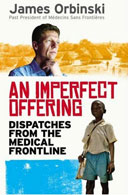
An Imperfect Offering: Humanitarian Action in the Twenty-First Century
James Orbinski
Rider and Co £16.99, pp448
In August 1969, James Orbinski, who later would become one of the world's foremost humanitarian doctors, travelled downtown with his mother from his family's home in Notre-Dame-de-Grâce, then the English ghetto of Mont-real, to the Jewish quarter of the city to buy new shoes for school. Orbinski was nine years old and this was an annual ritual for his family, who had emigrated from England two years earlier.
The night before, Orbinski had watched a TV documentary about the Holocaust and so, when the shopkeeper lifted the shoes from the box, inadvertently giving him a glimpse of the 'blue tattooed numbers' on his forearm, the boy knew exactly what he was looking at. That night, he writes in his memoir, he dreamed of himself, the shoe salesman, and an uncle who'd married a Jewish girl, 'all taking off our new shoes for the Nazis'. For a doctor who has spent his working life at the humanitarian frontline, striving to do his bit to relieve suffering, it was a prescient dream, for Orbinski has seen at first-hand the carnage wrought by the very worst latterday Nazis, not least the genocidal killers of Rwanda in 1994.
Orbinski's parents were Irish and their household fervently Catholic. In his early teens, he toyed with the idea of becoming a priest, 'but gave up on it when I caught sight of two priests embracing in the vestry'. None the less, he inherited his parents' keen social conscience and, while still deep in student debt after graduating from medical school, volunteered as a founding member of Médecins Sans Frontières Canada. Humanitarianism, he believed, was 'outside of politics, in some ways even superior to it'.
MSF was founded in 1971 by a group of French doctors, led by Raymond Borel and Bernard Kouchner. From its inception, MSF refused to let national borders get in the way of medical aid, adhering to the basic principles of humanitarian action established in 1864 when the Red Cross was founded: that everyone is worthy of assistance, regardless of their political, religious or racial affiliation; and that humanitarian action must operate free of political, economic or other outside influences.
Orbinski's first MSF mission was to Peru, in 1991, followed by Afghanistan, where he witnessed children being torn to pieces by anti-tank mines. But nothing could have prepared him for his posting in May 1994, when he volunteered to go to Rwanda. It would be an experience that would sear itself on his consciousness and that almost claimed his soul. It was, he writes, 'my undoing'. And yet, somehow, he managed to keep working: amputating limbs of machete victims; vaccinating children against measles and tetanus; setting up orphanages while all around was shellfire and the drunken hollering of Interahamwe youths brandishing homemade weapons.
He tells his extraordinary story in unpretentious, carefully weighed prose, but pulls no punches when describing his disgust at the failure of the international community in so many of the situations where he has served so selflessly. There is a telling moment, too, when he confronts Kouchner, MSF's illustrious founder, in Kigali. Kouchner wanted to orchestrate a large-scale media visit to the hospital where MSF was working. Orbinski, convinced this would do nothing to help the hundreds of thousands needing assistance, bluntly told Kouchner this would not be possible. Kouchner, unused to being treated by a subordinate in this way, screamed at him: 'You fucking know nothing... nothing!'
A lesser man could have capitulated. Not so Orbinski, for whom, one feels, celebrity of any kind is far less interesting than the central question with which he struggles in this compelling book: 'How are we to be in relation to the suffering of others?'
Writing of his decision to go to Rwanda, he says: 'I was 33, single and free. If I didn't at least try, I knew I could not live with myself.' He is, one can't help feeling, lucky to be alive at all.
· To order An Imperfect Offering for £15.99 with free UK p&p, go to observer.co.uk/bookshop or call 0870 836 0885

